You are using an out of date browser. It may not display this or other websites correctly.
You should upgrade or use an alternative browser.
You should upgrade or use an alternative browser.
Let The Eagle Scream Version 2: Star-Spangled-Boogaloo
- Thread starter Murica1776
- Start date
- Status
- Not open for further replies.
Threadmarks
View all 88 threadmarks
Reader mode
Reader mode
Recent threadmarks
From Camelot to Chaos: The Kennedy Years "He's A Damn Demagogue:" The One-Term Presidency of Thomas Sowell The Dragon Rises The World in 1980 The Country's Not Alright: The One-Term Presidency of Richard Brown Culture War: The New Jihad/Tenth Crusade The Great Melting Pot: Race Relations, Intermarriage and the Rise of "American Race Theory" "A New Eurasia"Be sure to check out the original version tooHey there! I found this TL recently and i really like it! I think I've reread it about 4 times, so i think that speaks for itself. Keep up the good work!
Could you please share a link with me?Be sure to check out the original version too
Could you please share a link with me?
Chapter 1: The Impeachment of Andrew Johnson and "New Reconstruction"
May 16th, 1868
The United States Senate has convened to convict President Andrew Johnson on "high crimes and misdemeanors." The vote will be close. The Democrats and several Republicans will not vote for impeachment. They believe the trial and presentation of evidence has been one sided and unfair.
In the end, the vote came down to one man; Edmund Ross. A moderate Republican, he had debated the trial internally for weeks. In the end, no one knew how he was going to vote. In the end, Ross sided with his party, and voted guilty. Andrew Johnson was removed from office by a vote of 40-18. He went quietly, and dissapeared to a life of obscurity in Tennessee.
Speaker of the House Schulyer Colfax was voted into the Presidency. Knowing that Colfax had some radical sympathies (he had voted for the 13th Amendment even though Speakers typically don't vote on issues on the floor), the Radical Republicans risked it all by reintroducing the Wade-Davis Bill. The bill failed, but a new bill called the Colfax Readmittance Bill succeeded.
This bill stated that 2/3 of all voters on the voter rolls for the 1860 Election had to swear loyalty to the Union before being readmitted. More troops were deployed to the South as fears of unrest spread. The North was right to worry...
Almost immediately, the South exploded into violence. The KKK and other like minded groups attacked thousands of blacks and northern whites. Northern newspapers screamed about southern atrocities every day and public opinion in the North hardened against Southern white supremacy. One Philadelphia paper paraphrased an abolitionist slogan "Is not the Negro a man and a brother?" It became a popular rallying cry of Northerners, Southern Republicans, and African Americans.
In 1868, Colfax won the Republican nomination, and the Presidency, with General Grant as Vice President. He swore to crush the KKK and any groups whose goal was to "terrorize the Negro into an unnatural, Satanic state of fear and subordinace." The Force Bill of 1869 was passed on March 3rd, and gave Federal troops the powers necessary to combat an enlarged and invigorated KKK. By mid 1871, the group had been crushed. The heroism of several African-American volunteers in protecting both whites and blacks from KKK violence caused further cracks in the edifuce of white supremacy.
Another way white supremacism was combated was developed by Vice President Grant, and saved the Union a great deal of trouble. Passionate, fiery orators, mainly preachers and pastors, were sent South to convince poor whites that white supremacy hurt them as well. The main focuses of these speeches was the New Testament (particularly parts preaching acceptance) and stirring up resentment against the old planter class. One quotation from a speech given in Alabama:
"Hatred of the Negro is neither Biblical, nor economical. The Bible says to love thy neighbor, not love thy white neighbor! But the human heart is inclined to hate! God knows this! Jesus knows this! The Devil knows this! So too did the old planter class know this! And they used that vile emotion, that most harmful of sins, to manipulate you! Because they know that if you can convince the lowest white man he's better than the best colored man, he won't notice you're picking his pocket! Hell, give him somebody to look down on, and he'll empty his pockets for you!"
These "Freedom Preachers" were wildly successful. Across the South, many poor whites went from viewing slavery and white supremacy as natural institutions, to tools used by a handful of wealthy people to tread on the rest of the population. Coming into the 1872 Election, southern resistance was still stiff, but starting to slacken....

President Colfax

A popular anti-KKK cartoon that was widely circulated

A sketch of three Klansmen
Hey guys! Sorry, life has been nuts lately. New Europe focused updates coming within the week!
Hey guys! Sorry for the delays, school, work, and the second vaccine dose all distracted me. I promise that I have more coming!
That's not a problem.Hey guys! Sorry for the delays, school, work, and the second vaccine dose all distracted me. I promise that I have more coming!
Np.Hey guys! Sorry for the delays, school, work, and the second vaccine dose all distracted me. I promise that I have more coming!
Don’t worry man, take all the time that you need.Hey guys! Sorry for the delays, school, work, and the second vaccine dose all distracted me. I promise that I have more coming!
Post-War Europe Part I: The Eastern Clients
I'm baaack!
Germany did concede to this rising nationalism, albeit in limited ways. The deportation of the Jews to America was a big one. Anti-Semitism had been rife in the region since the Russian Revolution, in which many of the leading revolutionaries had been Jews. The fact that the hated Stalin was a raging anti-Semite did nothing to ease these feelings among the region's ethnic groups. Jews were viewed as Communists, anti-nationals, un-European, and anti-Christian. During the war years and following, Kiev and Warsaw were home to some particularly vicious anti-Semitic pogroms. Germany "solving the Jewish Question" for her clients did much to restore goodwill. However, deporting a despised ethnic group wouldn't be enough. Reluctantly, Berlin made more concessions. Firstly, they cut their clients in on the war booty taken from across three continents. Gold bullion totalling $40 million was transferred to the Bank of Poland. Ukraine received $25 million in silver. Crimea had 130 French factories and power plants shipped piecemeal into the country and reassembled, vastly increasing the country's industrial base. The United Baltic Duchy received $20 million in war indemnities, and had another $25 million in debt forgiven by Berlin. This doesn't include the millions of dollars in goods pilfered by these troops during their time campaigning. Many Ukrainian peasant women wound up with mink coats and exotic produce like mangoes. Another, larger concession made was a slightly increased degree of political independence. The cord between Berlin and the capitals of Eastern Europe was by no means cut, but the practice of certain government officials having German "Big Brothers" was ended. Finally, Germany declared its unending opposition to Soviet Communism, then Eurasian Communism, and finally just Eurasianism. Strict though the Teutonic yoke might be, it had been positively delicate in comparison to the Russian knout. Eastern Europe was perhaps the most Russophobic place on Earth, and keeping them happy meant the odd bit of saber rattling against the Eurasians. Having covered the general picture, let's now evaluate these countries on an individual basis.
Poland thrived in the post-war era. The expulsion of Jews hampered economic growth some, but the appropriation of Jewish assets by Poles also helped reduce Polish poverty at the cost of Jewish rights. Meanwhile, Polish industry furnished many of the goods Scandinavia and their fellow Eastern Europeans craved, including steel and TV sets. Polish coal fueled electrification projects across Eastern Europe. Warsaw underwent a cultural renaissance in Polish language literature, creating works that were even lauded in Berlin and Vienna. One work in particular "A Pole's Odyssey," by Ksawery Wasyluk became Poland's modern national epic as it detailed the life of Andrezj Kaminski, born a Polish subject in Imperial Russia, who suffers greatly under Czarist rule. His family is beaten by Cossacks, taxes are heavy, and he is beaten in school for speaking Polish. Upon reaching adulthood, he is conscripted into the Imperial Russian Army, serving under the command of Colonel Nikolai Abakumov, a vicious megalomaniac who beats his Polish troops with a knout as he fantasizes about leading a future Russian charge across Europe to Lisbon. After narrowly escaping a German gas attack, he defects and serves as a scout for Colonel Martin Schiller, who is depicted as honorable, if something of an imperialistic boor. Andrezj is crucial to several victories, earning an Iron Cross after saving Colonel Schiller. When the war is over he married his sweetheart Jolanta. However, they have little money, and Andrezj's family farm is sold to a German homesteader after it's revealed that his parents are dead and siblings scattered. He simply can't afford it. Andrezj enrolls in the new Polish Army attached to the Germans, and Andrezj serves in the Congo, Latvia, and Mesopotamia while raising a family. Despite the adventures and good pay, he desires nothing more than to return to his beloved Poland. He insists that his three children, growing up in the melting pot of German imperial forces, learn two words of Polish for every foreign word they learn. When war breaks out in '39, Andrezj's sons Damian and Bartek enlist. He himself, now a captain, is recalled to Germany and leads Polish and German troops as they contain the French advance and slowly turn the tide. Andrezj is among the troops who conquer Paris, and loots a fabulous 120 carat ruby. Shortly before the war's conclusion, he is promoted to the rank of Colonel by his old commander, now General Schiller. He sells the ruby in Berlin. The novel concludes with Andrezj buying his family farm back from the homesteaders, and the announcement of his son Bartek's wife's first pregnancy. The novel won international acclaim as an allegory for the struggle of Polish nationhood, a twisting tale of adventure, and a work of literature. In 1975, it would be made the national novel of Poland by the government.
Ukraine was considered something of the "powerful idiot" of the Eastern European nations. The country's struggle to create a native intelligentsia and comprehensive high culture was an ongoing slog. Centuries of Russification had strangled the development of native cultural ideas, and the post-war deportations of Jews decimated what buds of a cultural class were there. However, Ukraine did have a strong sense of national identity, and although there was little in the way of high culture, the culture of Ukrainian peasants had a richness all its own. Even many city dwellers brought some of the old ways with them. What Ukraine lacked in high culture, it made up for in muscle. Pre-war Ukraine had a population of 40 million, but after the war it exploded. In the period from 1944-1964, 25 million Ukrainians were born, making the country one of the most populous in Europe. The rich agricultural soil of Ukraine, although often dominated by German agricultural corporations, fed this massive population and have a solid foundation for prosperity. Ukrainian industry, both native and German owned allowed for upward mobility. Although the country still lagged Poland and the UBD (Ukrainian car ownership rates were particularly abysmal) the country grew faster and more consistently than much of Europe. Militarily, Ukraine had the largest Army of any of Germany's puppets, clients, or minor allies, actually exceeding even the size of Portugal and Italy. Ukraine's somewhat backward industrial base meant that the Germans equipped much of this Army, but it was still formidable. Getting command of Ukrainian divisions within the German Army was seen as a special privilege second only to the Crimean Tatars. Furthermore, Ukrainians provided the bulk of the Eastern European auxiliary forces, and it was overwhelmingly Ukrainians who stared down the ravenous EU.
Crimea underwent a transformation in this period. Once considered little more than a glorified warm water port and vacation dacha for the Russian and German elites, the plunder of French factories and power plants allowed Crimea to take full advantage of rich deposits of minerals, resulting in a miniature industrial revolution. The government also began reforming the Tatar language, complete with an alphabet styled on the German one. Aside from this, the tiny republic continued to be Berlin's most fiercely committed ally in the region, and instituted mandatory national service for both sexes, furthering their warrior reputation.
The United Baltic Duchy was Berlin's favored client in the East. This is largely thanks to the region's sizable German ruling class, and it's high level of economic development. The UBD was on par with most European powers, and even outperformed the hated EU. This prosperity hid tensions within Baltic society. In the years before the war, the German ruling class instituted de facto segregation against the native Balts. After the war this policy continued, but had to be tweaked significantly. Part of this was due to changes in Germany. The old racialized view of Slavs as inherently inferior was being discarded. This meant that should significant ethnic violence break out, Germany wouldn't necessarily back an openly racist and oppressive ruling class, and if it did, might enforce reforms or even annex the region (although some Baltic Germans favored this). Instead, there was a process of cultural and linguistic Germanization implemented. Native Balts weren't forced to Germanize, but those who refused were still segregated into other communities. Germanized Balts, however, enjoyed all the privileges of the elite, although there was still some bigotry. Another development in this era was a privileging of the Lutheran Estonians and Latvians over the Catholic Lithuanians. This system would eventually be replaced, but that's far down the road.
In the post-war era, Germany's client states in Eastern Europe became true nations again. Even if they were still subservient to Berlin, these nations were allowed greater political, economic, and cultural freedom than in years past. Despite Berlin's continued hold on the region, the Eastern Europeans were broadly satisfied with German control. They were independent(ish) and prospering. Germany guaranteed their security against the increasingly alien Eurasian Union. German trade brought wealth. Although some resentment was inevitable, Germany's Eastern flank was very secure in the post-war era.
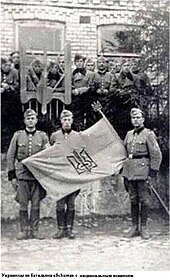
Members of a Ukrainian border unit display their colors (1948)
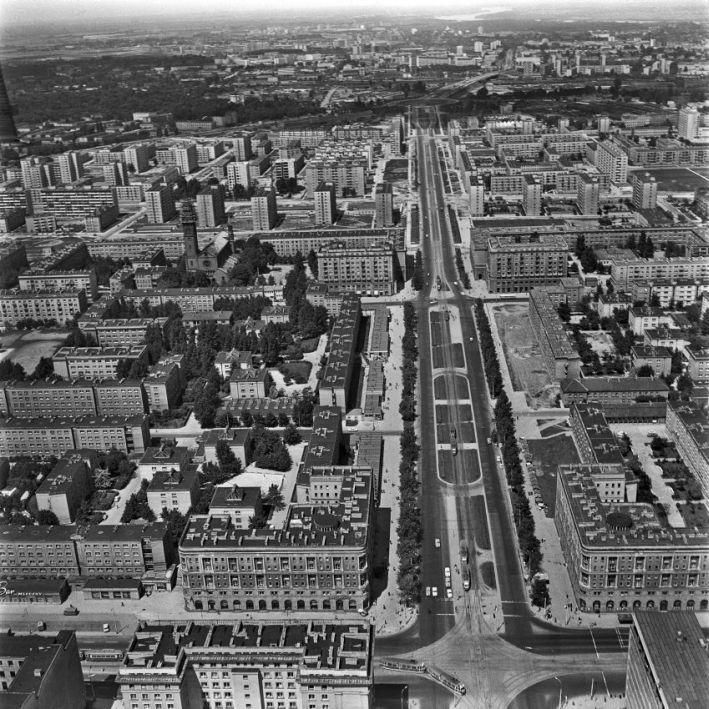
Warsaw, 1951
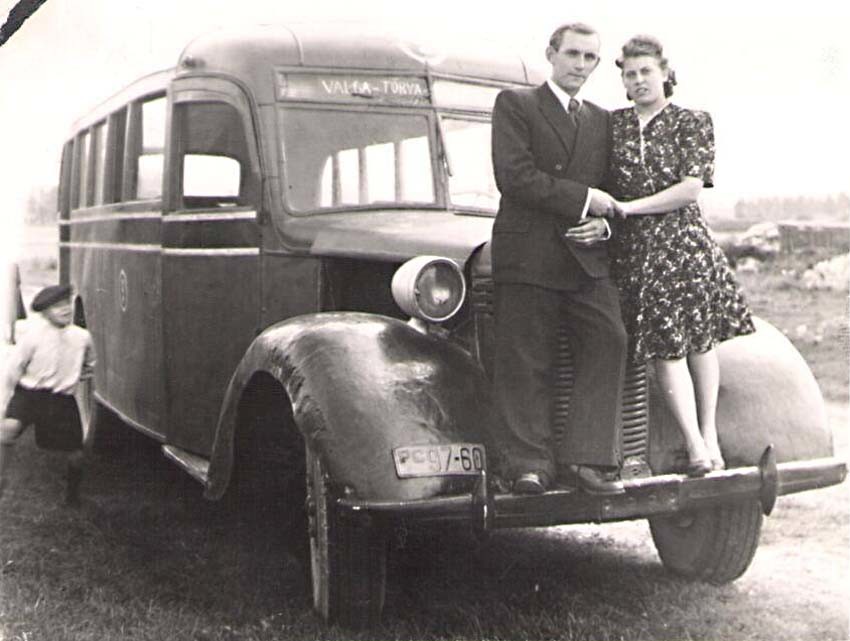
An Estonian Lutheran couple poses with their church's new shuttle (1953)
Post-War Europe Part I: The Eastern Clients
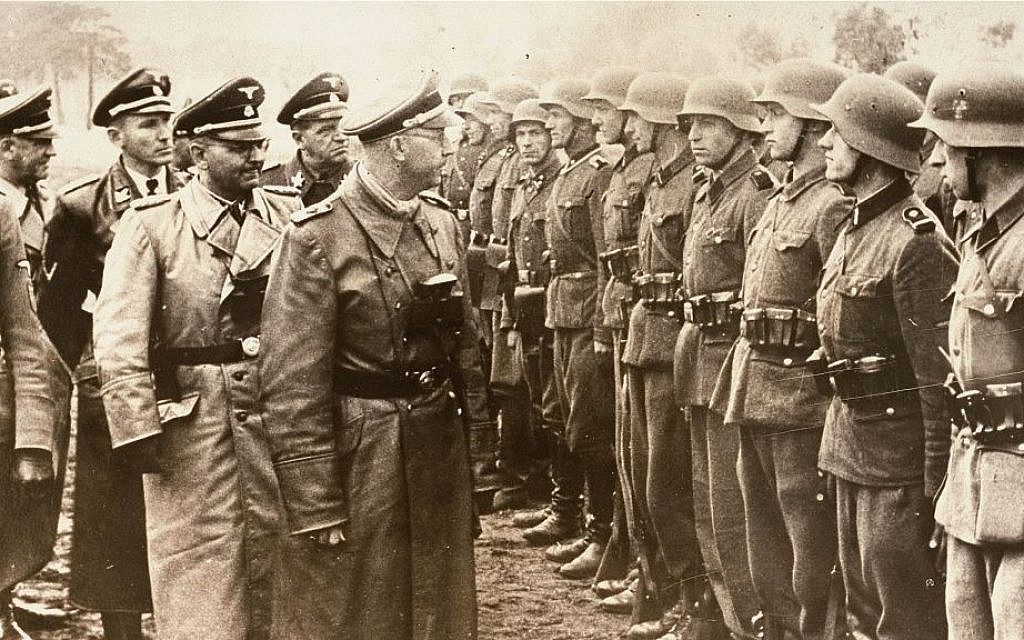
A German Army General inspects soldiers of the Ukrainian Army (1947)
One of the areas most and least effected by the War was the Mitteleuropa sphere of Germany. This sphere, consisting of Poland, Ukraine, Crimea, and the United Baltic Duchy had been spared from pretty much all war damage. However, Ukrainians, Poles, Crimean Tatars, and non-German Balts had been conscripted en masse to fuel the German war effort around the world. Ukrainian wheat and butter fed the whole war effort. Polish coal powered homes and factories across the German world. Baltic iron and timber was used for a dozen purposes. Germany had called upon her puppet states, doing everything to shift as much of the costs of the war onto them as possible, and they answered. However, dissatisfaction was growing with the arrangements between Berlin and her puppet states. They had sacrificed much, and they wanted compensation.
A German Army General inspects soldiers of the Ukrainian Army (1947)
Germany did concede to this rising nationalism, albeit in limited ways. The deportation of the Jews to America was a big one. Anti-Semitism had been rife in the region since the Russian Revolution, in which many of the leading revolutionaries had been Jews. The fact that the hated Stalin was a raging anti-Semite did nothing to ease these feelings among the region's ethnic groups. Jews were viewed as Communists, anti-nationals, un-European, and anti-Christian. During the war years and following, Kiev and Warsaw were home to some particularly vicious anti-Semitic pogroms. Germany "solving the Jewish Question" for her clients did much to restore goodwill. However, deporting a despised ethnic group wouldn't be enough. Reluctantly, Berlin made more concessions. Firstly, they cut their clients in on the war booty taken from across three continents. Gold bullion totalling $40 million was transferred to the Bank of Poland. Ukraine received $25 million in silver. Crimea had 130 French factories and power plants shipped piecemeal into the country and reassembled, vastly increasing the country's industrial base. The United Baltic Duchy received $20 million in war indemnities, and had another $25 million in debt forgiven by Berlin. This doesn't include the millions of dollars in goods pilfered by these troops during their time campaigning. Many Ukrainian peasant women wound up with mink coats and exotic produce like mangoes. Another, larger concession made was a slightly increased degree of political independence. The cord between Berlin and the capitals of Eastern Europe was by no means cut, but the practice of certain government officials having German "Big Brothers" was ended. Finally, Germany declared its unending opposition to Soviet Communism, then Eurasian Communism, and finally just Eurasianism. Strict though the Teutonic yoke might be, it had been positively delicate in comparison to the Russian knout. Eastern Europe was perhaps the most Russophobic place on Earth, and keeping them happy meant the odd bit of saber rattling against the Eurasians. Having covered the general picture, let's now evaluate these countries on an individual basis.
Poland thrived in the post-war era. The expulsion of Jews hampered economic growth some, but the appropriation of Jewish assets by Poles also helped reduce Polish poverty at the cost of Jewish rights. Meanwhile, Polish industry furnished many of the goods Scandinavia and their fellow Eastern Europeans craved, including steel and TV sets. Polish coal fueled electrification projects across Eastern Europe. Warsaw underwent a cultural renaissance in Polish language literature, creating works that were even lauded in Berlin and Vienna. One work in particular "A Pole's Odyssey," by Ksawery Wasyluk became Poland's modern national epic as it detailed the life of Andrezj Kaminski, born a Polish subject in Imperial Russia, who suffers greatly under Czarist rule. His family is beaten by Cossacks, taxes are heavy, and he is beaten in school for speaking Polish. Upon reaching adulthood, he is conscripted into the Imperial Russian Army, serving under the command of Colonel Nikolai Abakumov, a vicious megalomaniac who beats his Polish troops with a knout as he fantasizes about leading a future Russian charge across Europe to Lisbon. After narrowly escaping a German gas attack, he defects and serves as a scout for Colonel Martin Schiller, who is depicted as honorable, if something of an imperialistic boor. Andrezj is crucial to several victories, earning an Iron Cross after saving Colonel Schiller. When the war is over he married his sweetheart Jolanta. However, they have little money, and Andrezj's family farm is sold to a German homesteader after it's revealed that his parents are dead and siblings scattered. He simply can't afford it. Andrezj enrolls in the new Polish Army attached to the Germans, and Andrezj serves in the Congo, Latvia, and Mesopotamia while raising a family. Despite the adventures and good pay, he desires nothing more than to return to his beloved Poland. He insists that his three children, growing up in the melting pot of German imperial forces, learn two words of Polish for every foreign word they learn. When war breaks out in '39, Andrezj's sons Damian and Bartek enlist. He himself, now a captain, is recalled to Germany and leads Polish and German troops as they contain the French advance and slowly turn the tide. Andrezj is among the troops who conquer Paris, and loots a fabulous 120 carat ruby. Shortly before the war's conclusion, he is promoted to the rank of Colonel by his old commander, now General Schiller. He sells the ruby in Berlin. The novel concludes with Andrezj buying his family farm back from the homesteaders, and the announcement of his son Bartek's wife's first pregnancy. The novel won international acclaim as an allegory for the struggle of Polish nationhood, a twisting tale of adventure, and a work of literature. In 1975, it would be made the national novel of Poland by the government.
Ukraine was considered something of the "powerful idiot" of the Eastern European nations. The country's struggle to create a native intelligentsia and comprehensive high culture was an ongoing slog. Centuries of Russification had strangled the development of native cultural ideas, and the post-war deportations of Jews decimated what buds of a cultural class were there. However, Ukraine did have a strong sense of national identity, and although there was little in the way of high culture, the culture of Ukrainian peasants had a richness all its own. Even many city dwellers brought some of the old ways with them. What Ukraine lacked in high culture, it made up for in muscle. Pre-war Ukraine had a population of 40 million, but after the war it exploded. In the period from 1944-1964, 25 million Ukrainians were born, making the country one of the most populous in Europe. The rich agricultural soil of Ukraine, although often dominated by German agricultural corporations, fed this massive population and have a solid foundation for prosperity. Ukrainian industry, both native and German owned allowed for upward mobility. Although the country still lagged Poland and the UBD (Ukrainian car ownership rates were particularly abysmal) the country grew faster and more consistently than much of Europe. Militarily, Ukraine had the largest Army of any of Germany's puppets, clients, or minor allies, actually exceeding even the size of Portugal and Italy. Ukraine's somewhat backward industrial base meant that the Germans equipped much of this Army, but it was still formidable. Getting command of Ukrainian divisions within the German Army was seen as a special privilege second only to the Crimean Tatars. Furthermore, Ukrainians provided the bulk of the Eastern European auxiliary forces, and it was overwhelmingly Ukrainians who stared down the ravenous EU.
Crimea underwent a transformation in this period. Once considered little more than a glorified warm water port and vacation dacha for the Russian and German elites, the plunder of French factories and power plants allowed Crimea to take full advantage of rich deposits of minerals, resulting in a miniature industrial revolution. The government also began reforming the Tatar language, complete with an alphabet styled on the German one. Aside from this, the tiny republic continued to be Berlin's most fiercely committed ally in the region, and instituted mandatory national service for both sexes, furthering their warrior reputation.
The United Baltic Duchy was Berlin's favored client in the East. This is largely thanks to the region's sizable German ruling class, and it's high level of economic development. The UBD was on par with most European powers, and even outperformed the hated EU. This prosperity hid tensions within Baltic society. In the years before the war, the German ruling class instituted de facto segregation against the native Balts. After the war this policy continued, but had to be tweaked significantly. Part of this was due to changes in Germany. The old racialized view of Slavs as inherently inferior was being discarded. This meant that should significant ethnic violence break out, Germany wouldn't necessarily back an openly racist and oppressive ruling class, and if it did, might enforce reforms or even annex the region (although some Baltic Germans favored this). Instead, there was a process of cultural and linguistic Germanization implemented. Native Balts weren't forced to Germanize, but those who refused were still segregated into other communities. Germanized Balts, however, enjoyed all the privileges of the elite, although there was still some bigotry. Another development in this era was a privileging of the Lutheran Estonians and Latvians over the Catholic Lithuanians. This system would eventually be replaced, but that's far down the road.
In the post-war era, Germany's client states in Eastern Europe became true nations again. Even if they were still subservient to Berlin, these nations were allowed greater political, economic, and cultural freedom than in years past. Despite Berlin's continued hold on the region, the Eastern Europeans were broadly satisfied with German control. They were independent(ish) and prospering. Germany guaranteed their security against the increasingly alien Eurasian Union. German trade brought wealth. Although some resentment was inevitable, Germany's Eastern flank was very secure in the post-war era.

Members of a Ukrainian border unit display their colors (1948)

Warsaw, 1951

An Estonian Lutheran couple poses with their church's new shuttle (1953)
We're going to take a tour of Europe and Germany's empire, check in on China, and then kick off the late 50's and early 60's with the Space Race and a Brazilian intervention in Portugal.
Why the Pig Farmer here?
A German Army General inspects soldiers of the Ukrainian Army (1947)
Why the Pig Farmer here?
It's just a really good picture of Ukrainian troops in German gear.
Are the regional guides getting cut short?
Not cut short, just split up. Expect to see some more in the future that are also a bit more updated.
It's nice to see TTL back again.
It's good to be back!
Nice to see this back. While this Germany is certainly better then their former enemies or OTL Germany, they are still very much grey. I like it.
Nice to see this back. While this Germany is certainly better then their former enemies or OTL Germany, they are still very much grey. I like it.
That's definitely how I like to think of Germany. IMO, the most messed up big power is going to be the EU, and they're not going to suffer the same fate as the USSR. Germany is also going to have real trouble in the Middle East that is probably not going to be handled in the classiest way (although nothing like the EU). You're also going to see issues in Africa, but these are going to be handled differently and in a less crappy fashion.
This shouldn't be taken as a whole bunch of concrete plans, but here's a general idea of TTL's future:

Finalized plans for King, Liberia, a city built on an artificial island off the country's coast. The city is predominantly inhabited by workers in Monrovia's thriving genetech industry. Construction was completed in 2014.

Ballerina hologram in Wuhan, China (2020)
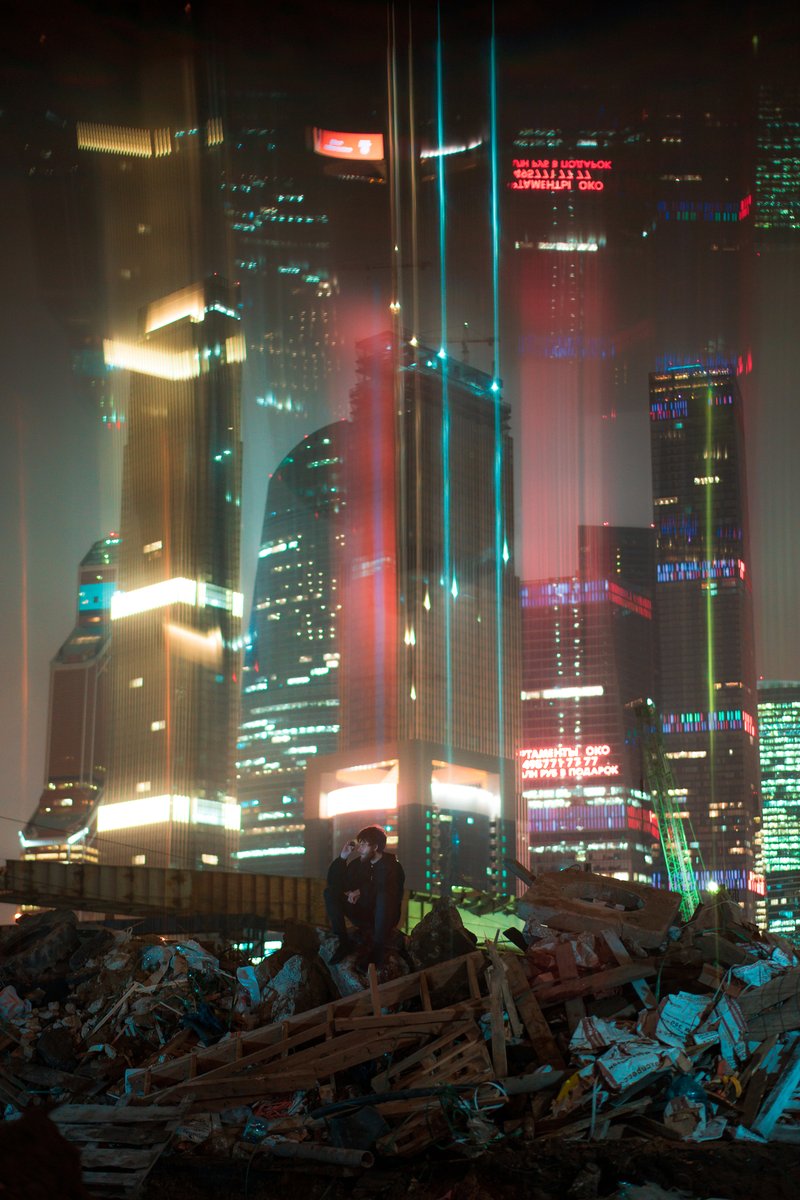
Moscow, Eurasian Union (2017)

A typical spa in Berlin (2012)

An electronic tattoo made in China (2018)

The smart technology in the average American home (2013)

The 2015 Electric Ravager H2, with 250 mile range
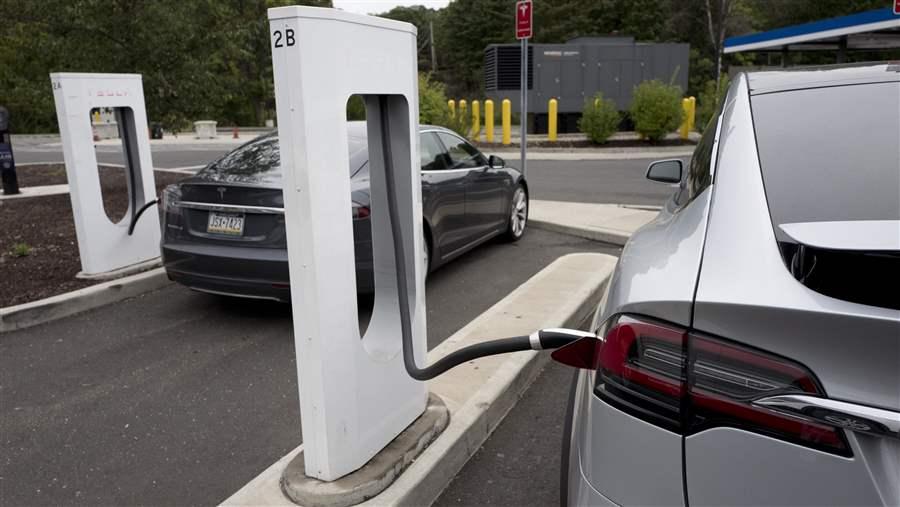
Charging station at roadside rest stop (2016)
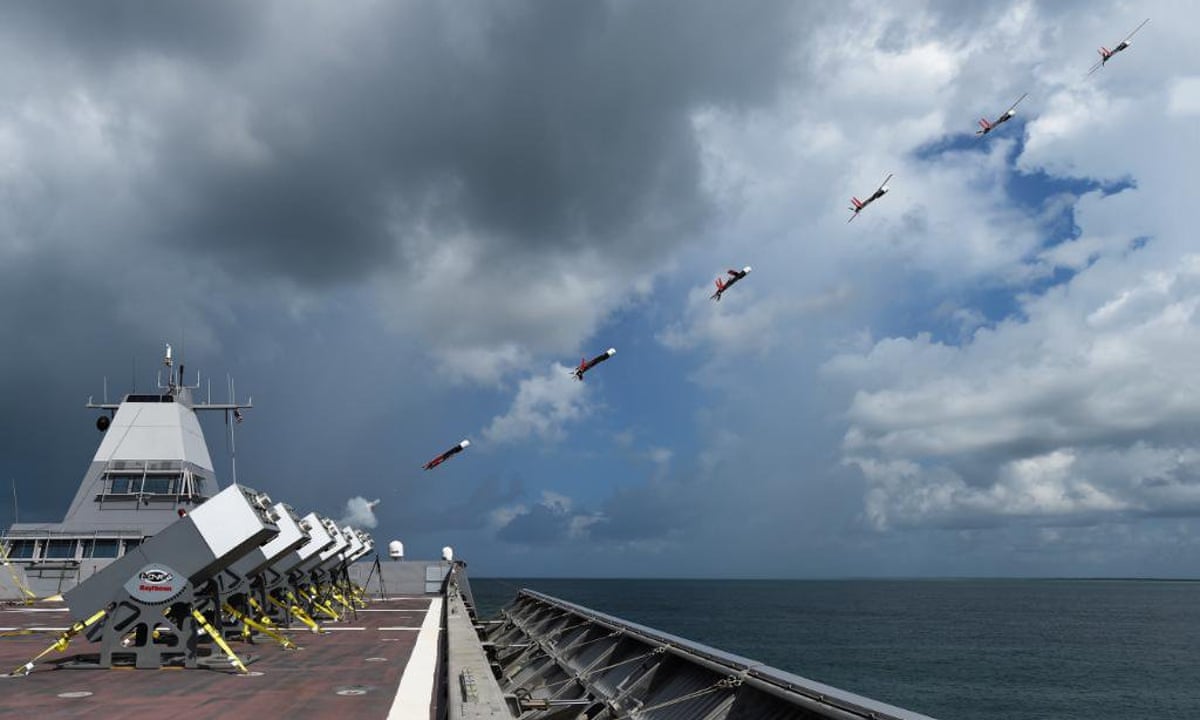
A German cruiser launches an Armed, Fully Autonomous Drone Swarm near a restive province in German Arabia (2020)

Finalized plans for King, Liberia, a city built on an artificial island off the country's coast. The city is predominantly inhabited by workers in Monrovia's thriving genetech industry. Construction was completed in 2014.

Ballerina hologram in Wuhan, China (2020)

Moscow, Eurasian Union (2017)

A typical spa in Berlin (2012)

An electronic tattoo made in China (2018)

The smart technology in the average American home (2013)

The 2015 Electric Ravager H2, with 250 mile range

Charging station at roadside rest stop (2016)

A German cruiser launches an Armed, Fully Autonomous Drone Swarm near a restive province in German Arabia (2020)
Hey there! I found this TL recently and i really like it! I think I've reread it about 4 times, so i think that speaks for itself. Keep up the good work!
Don't know how I missed this comment. Thank you so much! That means a lot to me.
Threadmarks
View all 88 threadmarks
Reader mode
Reader mode
Recent threadmarks
From Camelot to Chaos: The Kennedy Years "He's A Damn Demagogue:" The One-Term Presidency of Thomas Sowell The Dragon Rises The World in 1980 The Country's Not Alright: The One-Term Presidency of Richard Brown Culture War: The New Jihad/Tenth Crusade The Great Melting Pot: Race Relations, Intermarriage and the Rise of "American Race Theory" "A New Eurasia"- Status
- Not open for further replies.
Share: